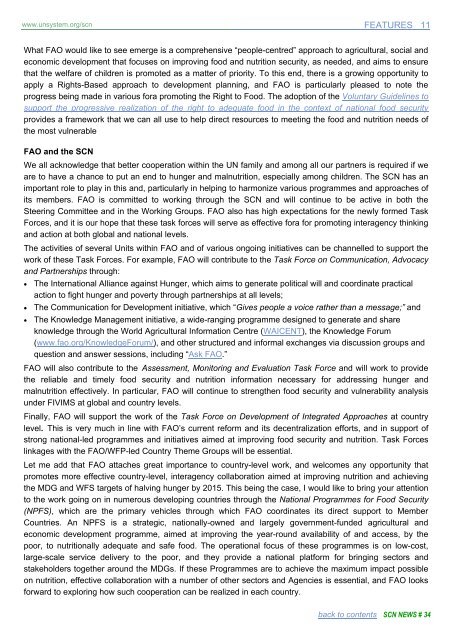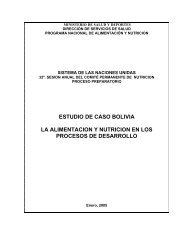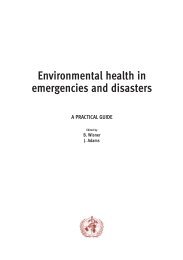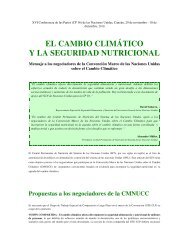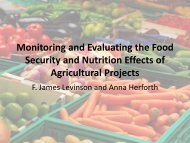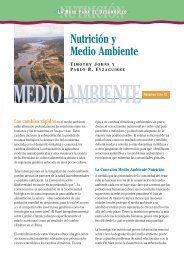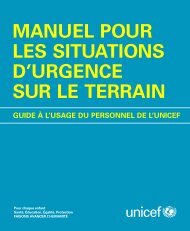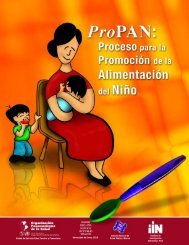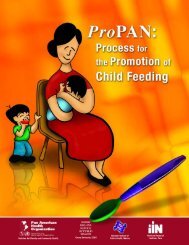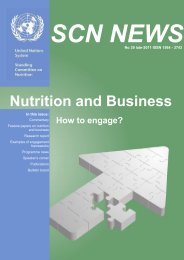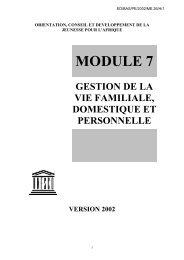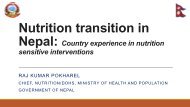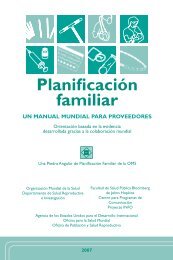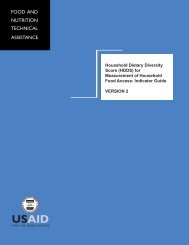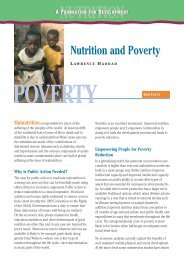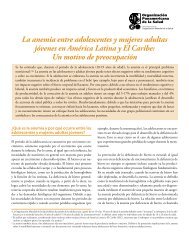SCN News No 34 - UNSCN
SCN News No 34 - UNSCN
SCN News No 34 - UNSCN
Create successful ePaper yourself
Turn your PDF publications into a flip-book with our unique Google optimized e-Paper software.
www.unsystem.org/scn FEATURES 11<br />
What FAO would like to see emerge is a comprehensive “people-centred” approach to agricultural, social and<br />
economic development that focuses on improving food and nutrition security, as needed, and aims to ensure<br />
that the welfare of children is promoted as a matter of priority. To this end, there is a growing opportunity to<br />
apply a Rights-Based approach to development planning, and FAO is particularly pleased to note the<br />
progress being made in various fora promoting the Right to Food. The adoption of the Voluntary Guidelines to<br />
support the progressive realization of the right to adequate food in the context of national food security<br />
provides a framework that we can all use to help direct resources to meeting the food and nutrition needs of<br />
the most vulnerable<br />
FAO and the <strong>SCN</strong><br />
We all acknowledge that better cooperation within the UN family and among all our partners is required if we<br />
are to have a chance to put an end to hunger and malnutrition, especially among children. The <strong>SCN</strong> has an<br />
important role to play in this and, particularly in helping to harmonize various programmes and approaches of<br />
its members. FAO is committed to working through the <strong>SCN</strong> and will continue to be active in both the<br />
Steering Committee and in the Working Groups. FAO also has high expectations for the newly formed Task<br />
Forces, and it is our hope that these task forces will serve as effective fora for promoting interagency thinking<br />
and action at both global and national levels.<br />
The activities of several Units within FAO and of various ongoing initiatives can be channelled to support the<br />
work of these Task Forces. For example, FAO will contribute to the Task Force on Communication, Advocacy<br />
and Partnerships through:<br />
• The International Alliance against Hunger, which aims to generate political will and coordinate practical<br />
action to fight hunger and poverty through partnerships at all levels;<br />
• The Communication for Development initiative, which “Gives people a voice rather than a message;” and<br />
• The Knowledge Management initiative, a wide-ranging programme designed to generate and share<br />
knowledge through the World Agricultural Information Centre (WAICENT), the Knowledge Forum<br />
(www.fao.org/KnowledgeForum/), and other structured and informal exchanges via discussion groups and<br />
question and answer sessions, including “Ask FAO.”<br />
FAO will also contribute to the Assessment, Monitoring and Evaluation Task Force and will work to provide<br />
the reliable and timely food security and nutrition information necessary for addressing hunger and<br />
malnutrition effectively. In particular, FAO will continue to strengthen food security and vulnerability analysis<br />
under FIVIMS at global and country levels.<br />
Finally, FAO will support the work of the Task Force on Development of Integrated Approaches at country<br />
level. This is very much in line with FAO’s current reform and its decentralization efforts, and in support of<br />
strong national-led programmes and initiatives aimed at improving food security and nutrition. Task Forces<br />
linkages with the FAO/WFP-led Country Theme Groups will be essential.<br />
Let me add that FAO attaches great importance to country-level work, and welcomes any opportunity that<br />
promotes more effective country-level, interagency collaboration aimed at improving nutrition and achieving<br />
the MDG and WFS targets of halving hunger by 2015. This being the case, I would like to bring your attention<br />
to the work going on in numerous developing countries through the National Programmes for Food Security<br />
(NPFS), which are the primary vehicles through which FAO coordinates its direct support to Member<br />
Countries. An NPFS is a strategic, nationally-owned and largely government-funded agricultural and<br />
economic development programme, aimed at improving the year-round availability of and access, by the<br />
poor, to nutritionally adequate and safe food. The operational focus of these programmes is on low-cost,<br />
large-scale service delivery to the poor, and they provide a national platform for bringing sectors and<br />
stakeholders together around the MDGs. If these Programmes are to achieve the maximum impact possible<br />
on nutrition, effective collaboration with a number of other sectors and Agencies is essential, and FAO looks<br />
forward to exploring how such cooperation can be realized in each country.<br />
back to contents <strong>SCN</strong> NEWS # <strong>34</strong>


